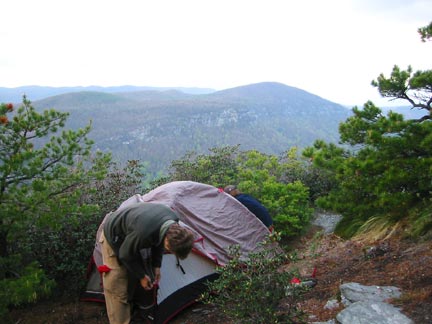
Community Learning (a new concept that claims students are better learners when they are members of a supportive community) and environmental studies are central to what we do at the Castle Rock Institute. We sponsor a semester-long environmental studies program for college students that combines a range of environmental adventure activities and 300-level courses in the Humanities.

The Castle Rock Institute is an off-campus research center for the Humanities newly affiliated with Brevard College (a liberal arts college in western North Carolina). Each semester it seeks applications from college students and scholars from the United States and abroad to live, study and experience the environmentals together. Housed in a lodge set in the Blue Ridge Mountains of Western North Carolina, the Institute aims to enliven the study of the Humanities both through focused interdisciplinary classwork, and through organized group environmental activities. The Castle Rock Institute is dedicated to investigating links between scholarship in the Humanities and the practical dimensions of human life in the natural and social world.
Study Off Campus
The Institute encourages interdisciplinary thought and experimentation by focusing each semester on a particular issue, idea or theme drawn from the Humanities. This theme serves as the main topic of discussion and area of research for residents at the Institute. This is a unique environmental studies program.
Visiting students enroll in four courses taught at Castle Rock by Institute Senior Fellows. Each course meets regularly throughout the semester and awards four hours of college credit. Students also spend several full and half days per week participating in small group activities like rock climbing, backpacking, and paddling. Environmental studies at the Institute strives to balance and integrate scholarship and adventure, and believes that doing so can realize significant benefits for both.
Different from the historical approach of most college Humanities programs, the curriculum at the Castle Rock Institute is organized thematically. Instead of sweeping through a series of "great books," all of the courses offered during each semester at the Institute address a single issue, idea or theme drawn from the Humanities. Accordingly, each class explicitly considers how insights offered by the other disciplines can contribute to an overall understanding of the theme at hand. For example, a semester devoted to the notion of "identity" may consider how the use of masks in African religious rituals or how Baja conceptions of self can inform a New Zealand novel, or can affect the composition of a painting or pencil sketch.
As a complement to its academic mission, the Castle Rock Institute organizes for its residents a variety of adventure activities. The Institute takes seriously the idea that there is a fundamental connection between body and mind, between the embodied practice of lived experience and the more abstract, theoretical concerns of the intellect. It sees, in other words, a mutually reinforcing relationship between direct and intense contact with the environmental world (environmental studies) and the scholarly goals central to the Humanities. Focusing on meaningful expressions of this relationship, challenges students to find a balance between real life and their studies.
Click Here to learn more
(c) Copyright 2006 Castle Rock Institute
|